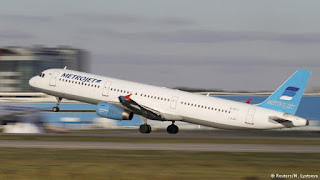Russian Jet Downed by Bomb Brits say and Suspend Service from Egypt {Latest}
The British prime minister suspends UK-bound flights from the Egyptian airport, but doesn’t reveal why they believe a bomb may be the culprit.
Concerned a bomb may have taken down the Russian airline that crashed in Egypt’s Sinai region on Saturday, the British government on Wednesday suspended all daily British-bound flights departing a southern resort town.
Ben Watson is news editor for Defense One. He previously worked for NPR's “All Things Considered” and “Here and Now” in Washington, D.C. Watson served for five years in the U.S. Army, where he was an award-winning combat cameraman and media advisor for southern Afghanistan's special operations ... Full Bio
“While the investigation is still ongoing we cannot say categorically why the Russian jet crashed. As more information has come to light, we have we have become concerned that the plane may well have been brought down by an explosive device,” the British prime minister’s office said in a statement Wednesday.
The statement out of 10 Downing Street echoes a similar warning from U.S. Director of National Intelligence James Clapper on Monday at the Defense One Summit. When asked if ISIS has the ability to shoot down an airliner, Clapper called it “unlikely,” but said “I wouldn’t rule it out…We don’t have any direct evidence of any terrorist involvement yet.”
On Monday, an American infrared satellite “detected a heat flash at the same time and in the same vicinity over the Sinai where the Russian passenger plane crashed,” a U.S. official told NBC News. “According to the official, U.S. intelligence analysts believe it could have been some kind of explosion on the aircraft itself, either a fuel tank or a bomb, but that there’s no indication that a surface-to-air missile brought the plane down.”
The plane crashed about 20 minutes after takeoff from Sharm el-Sheikh, killing all 224 passengers on board in the worst civil aviation disaster in Russia’s history.
The Islamic State’s Sinai affiliate released an audio message on Wednesday repeating their previous claim to have downed the airliner. But the group provided few details and Egypt’s Prime Minister Abdul Fattah al-Sisi dismissed the claim as “propaganda,” according to the Associated Press.
White House spokesman Josh Earnest refused to comment on the ongoing investigations, but said the U.S. already had standing warnings for civil aviation over the Sinai. He cited a March 2015 advisory from the Federal Aviation Administration about the risks from insurgents—“Man-Portable Air Defense Systems (MANPADS), small arms fire, and indirect fire from mortars and rockets targeting Sinai airports”—to aircraft passing below 26,000 feet in the Sinai airspace, and an earlier warning for flying over 24,000 feet.
“Attacks against aircraft in-flight or weapons fire targeting Sinai airports can occur with little or no warning,” the FAA warned, in March.
Defenseone.com
Latest from the Russian Government:
A Russian aviation official said the investigation was looking into the possibility of an object stowed on board causing the disaster.
"There are two versions now under consideration: something stowed inside (the plane) and a technical fault. But the airplane could not just break apart in the air – there should be some action. A rocket is unlikely as there are no signs of that," the Russian official said.
Security experts and investigators have said the plane is unlikely to have been struck from the outside and Sinai-based militants are not believed to possess the technology to shoot down a jet from a cruising altitude above 30,000 feet.
Any evidence that a bomb knocked the plane out of the sky would deal a heavy blow to tourism in Egypt, a pillar of the economy that is struggling to recover after years of political turmoil, and would also undermine Sisi's assertions that Cairo has brought under control Sinai Province's insurgency.
Sinai Province has killed hundreds of Egyptian soldiers and police since Sisi, as army chief, toppled Islamist President Mohamed Mursi in 2013 after mass protests against his rule.
Sisi was elected president last year on promises he would stabilize Egypt and rebuild its shattered economy. Critics say his tough crackdown on Islamists will only create more radicals in Egypt, which has fought militants for decades.
 |
| Remains of the Russian Jet while an Egyptian chopper hovers above |
Latest from the Russian Government:
A Russian aviation official said the investigation was looking into the possibility of an object stowed on board causing the disaster.
"There are two versions now under consideration: something stowed inside (the plane) and a technical fault. But the airplane could not just break apart in the air – there should be some action. A rocket is unlikely as there are no signs of that," the Russian official said.
Security experts and investigators have said the plane is unlikely to have been struck from the outside and Sinai-based militants are not believed to possess the technology to shoot down a jet from a cruising altitude above 30,000 feet.
Any evidence that a bomb knocked the plane out of the sky would deal a heavy blow to tourism in Egypt, a pillar of the economy that is struggling to recover after years of political turmoil, and would also undermine Sisi's assertions that Cairo has brought under control Sinai Province's insurgency.
Sinai Province has killed hundreds of Egyptian soldiers and police since Sisi, as army chief, toppled Islamist President Mohamed Mursi in 2013 after mass protests against his rule.
Sisi was elected president last year on promises he would stabilize Egypt and rebuild its shattered economy. Critics say his tough crackdown on Islamists will only create more radicals in Egypt, which has fought militants for decades.


Comments